ADSactly Literature: Soulmates throughout literature – the ongoing myth of Adam and Eve
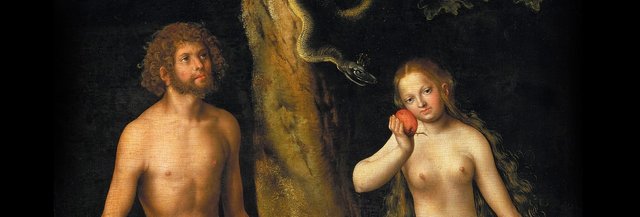
source
Before we go any further, let me just assure you that this is not a religious article in the slightest, although it touches heavily upon the afterlife and quite a few religious concepts. Also, I would like to mention that the title for this post is largely a credit to the book Adam and Eve, by Romanian writer Liviu Rebreanu.
The book Adam and Eve, published in 1925 in Romania, deals with the concept of metempsychosis, or reincarnation if you will. The book tells the story of two characters – Toma and Ileana – who are soulmates, destined to find each other throughout seven different lives. On his deathbed in his seventh life, Toma reaches the moment of awakening and is allowed to revisit all his other existences, to find his beloved again and again. His soul journeys through ancient Egypt, Babylon, Rome, medieval Germany and revolutionary France, finding his soul-mate and in each one, losing her again.
It plays heavily on the concept of transmigration – the moving of a soul from one body to another. This idea has its origins in the Orphic religion, Orpheus having taught that the body and soul are bound together in a phenomenal inequality, the soul being divine and longing to break free, while being imprisoned inside the human body. The followers of this religion believed that existence was basically an alternation between an unrestrained existence as a spirit and the inevitable rebirth in a mortal body.
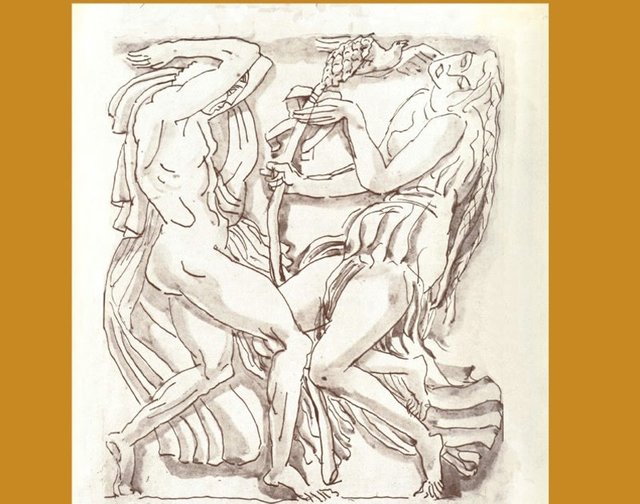
source
Orpheus also believed that these eternal prisoners could only dream of salvation, of breaking this chain of terrible events (because reincarnation here is seen as a suffering, a punishment to the soul) by leading a life of piety and turning to the gods, particularly to Dionysus, an idea that would later carry over into Christianity.
Naturally, the concept of metempsychosis has been one that fascinates artists for centuries. Writers such as John Donne, Edgar Allan Poe, Herman Melville and James Joyce all touched upon it, in their writings. As have Marcel Proust and Guy de Maupassant.
More recently, the subject has found its way not only in the above mentioned Adam and Eve, but also in an astonishingly similar tale, by British author Marcus Sedgwick – Midwinterblood.
'I will live seven times, and I will look for you and love you in each life.'
The back cover boasts, while the front asks the captivating question:
What would you sacrifice for someone you've loved forever?
Like Adam and Eve, the book begins in the last life, where on a mysterious island, the he in the story is about to be murdered on a stone table, echoing his first like, where as a king, centuries before, he was sacrificed to restore the island's crops and thus save his people from starvation. Again, we go through all of his their previous lives together, with a small difference. Whereas in Adam and Eve, the souls are lovers in each one, or at least fall madly in love in each one, in Midwinterblood, they're just together. In one life as lovers, but in another as brothers, or as mother and child in yet another.
Perhaps my favorite one is their fifth existence, The Airman, where during World War II, Erik (the he) lives with his wife and child on the island and they refuse to take part in the war, they try to keep away from the fighting as much as they can, but at one point, the fighting comes to them. A soldier falls with his military plane onto their island, wounded and dying, so they begin to care for him, to nurse him back to health, despite Erik's misgivings and fear that it will draw the enemies' attention, and might get them killed. The wounded airman and Erik have many spats throughout the story until at one point, Erik grabs the airman's wallet in order to burn it (so as to destroy any trace of his fighter life, in case enemy soldiers come looking). But then he opens the wallet and looks inside, seeing a picture of the airman's own wife and little girl. Little girl whom he recognizes as his beloved from another life, his other half. The story ends with Erik helping the airman leave on a boat, to get back to his family. As the enemy soldiers arrive, they see the boat far out in the water and execute Erik for helping the airman.
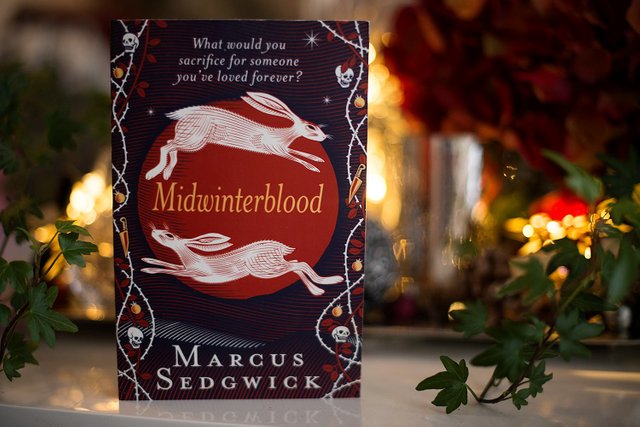
source
The two books bear some interesting similarities, such as the number seven, which is generally considered to be a special number, in various religions (seven days of Creation, anyone?). “Avenged sevenfold” which is not only a great heavy metal band, but a quote from the Book of Genesis -
"if Cain shall be avenged sevenfold"
The seven deadly sins, as well as many other representations of the number, are present in Christian beliefs.
The Hindu belief that there are seven worlds in the Universe, seven seas (sound familiar?) in the world and seven Rishis (spiritual gurus); the seven chakras; the Islamic seven hells and heavens; the number of mourning days in Judaism is also seven. All of these representations of this number show that it holds a very special place in most religions today and has a significance probably dating somewhere way back, before all of these religions even existed.
And so, although there is no religious writing (at least that I know of) that dictates the number of reincarnations must be seven, I imagine this is why these authors have stuck to this one number.
Then, there's the concept of singularity that is present in each life of each of the characters (in both novels) – the idea that
One man out of millions of men desires one woman out of millions of women. Adam and Eve!
Both of them, while tackling a very heavy concept – perhaps the heaviest of all, love – are also ultimately, novels of hope, speaking of a love that transcends time and space.
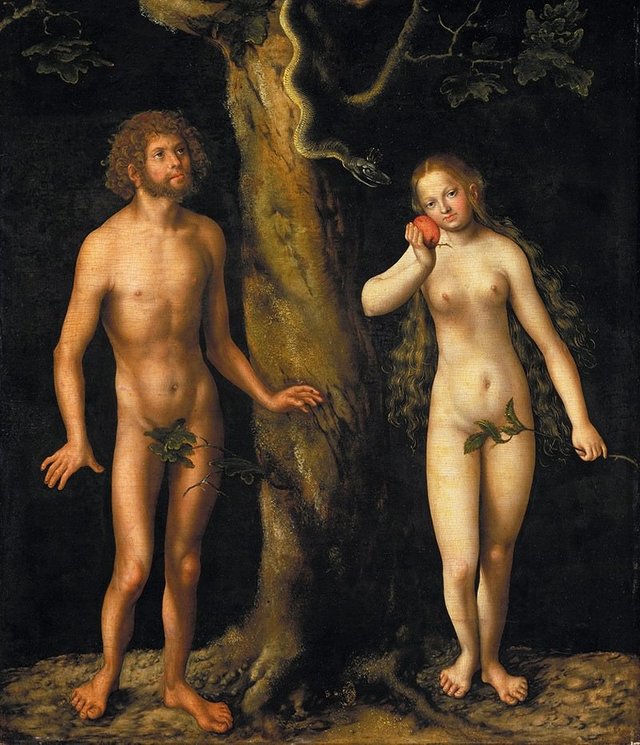
source
I think it's worth mentioning that the very idea of reincarnating soul mates would have probably passed us by, or at least wouldn't have been so prominent in our culture without the ancient Greek philosopher Plato, who adopted the idea of metempsychosis in some of his famous works, such as The Republic, in which he tells the story of a man who comes back from the dead and tells of the wonders on the other side, where he was humans being reincarnated as other animals.
Then, there's of course the Origins of Love, Plato's most compelling myth, perhaps.
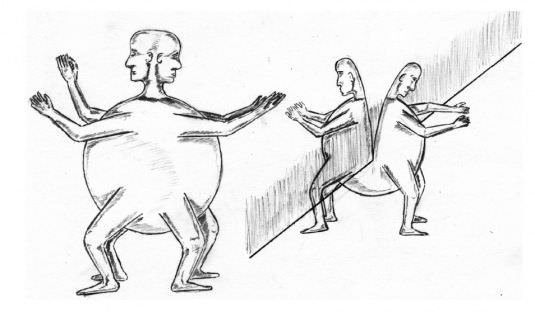
source
It states that once long ago, there were three types of people – children of the sun, two males, back-to-back; children of the earth, two females back-to-back; and children of the moon, a man and a woman back-to-back. And he tells of how they two heads, four arms, four legs etc. They looked out for each other and were perfect pairs. Until one day, Zeus decided they were becoming too powerful, that they were becoming a threat to the heavens and so, he cast down thunders to split them up in two, resulting into the human shape we know today.
And so, those separated halves look for each other continuously, hoping to one day form a whole again. Two halves of the same soul = soul mates.
And so, we have Plato to thank for at least contributing to this myth that we still love and tell today.
Authored by @honeydue
Click on the coin to join our Discord Chat

Witness proposal is here:
Go To Steem Witness Page
In the bottom of the page type: adsactly-witness and press vote.

Use small letters and no "@" sign. Or, click here to vote directly!
Thank you!
I am fascinated by this article, @honeydue! I would love to read Adam and Eve and Midwinterblood. I think as you say, the idea of reincarnation and soul mates is a constant in universal literature. In my country there is also a text on this subject, Malena de 5 Mundos by Ana Teresa Torres. In this novel we see a woman who seeks happiness in all her lives until she reaches one of them and confronts the great god of the spheres and claims him. Just these days I was thinking about the idea of impossible love, that love that although made in heaven, can not take shape, never gets to work or in the worst of cases, do not come to be found. Why do I think about these things? because this happens because the idea of a soul mate is really tempting. It is a very romantic idea to think that anywhere in the world and in any of the lives you live must be someone waiting for you, and that is your other half, the other that complements you. I don't know how much of this is pure literature, fiction, imagination promoted by the minds of romantic artists, but the only thing I know is that great loves are those that endure after goodbye and are destined to meet. Today I begin my day with the satisfaction of reading to you. Thanks to you and @adsactly for this interesting post.
Surprisingly, the book "Adam and Eve" was written by the author of the most hard-realistic novels in Romanian literature of the 20th century. In none of them, the love line ended with a happy conclusion. The tragic love collisions turned out to be the most important engine of the epic narration in the works of Rebreanu. In "Ion", the fate of the heroes is due to the intractable contradiction between the "call of the earth" and the "call of love." In Forest of the Hanged, an equally insoluble contradiction between the "call of love" and the "call of the motherland" defines the course of life and the drama of the main characters. In Ciuleandra, the boyar’s love for the young peasant is ruined by his unhealthy heredity.
Rebreanu has repeatedly repeated that of all the works written by him the most favorite book is "Adam and Eve". The explanation, formulated by the author himself, outlines some guidelines that may help in finding the answer to this question.
I know, it's very odd indeed. And surprising. I had to read Ion in school and to be honest, I wasn't a big fan of it and so, I was very pleasantly surprised when I stared reading A&E as it's quite different. Completely turned me around about Rebreanu. Yes, I love that this is his favorite! I just saw this quote the other day and I love the concept of a "book of eternal illusions".
Thank you for commenting, @aydogdy!!
Interesting article!!
I think so this story may have inspired the comic book heroes Hawkman and Hawkgirl, where they are reborn and find each other in different life times but then once they do they die and have to find each other again. So it's more like a curse upon them, however it's similar to this story. But there have also bee other fictional stories written on metempsychosis, because this concept serves as the ultimate romantic yet tragic story between a man and a woman.
And you're also right that number 7 being a mysteries number that has a lot of similarities between religions, could it be a coincidence? maybe or maybe not?
Hmm I guess there's no way to know what inspired the story of Hawkman and Hawkgirl ( did not know about them, thank you for that), but it's possible. As you said, it's the ultimate story and fantasy of all lovers. I also wanted to point out that in Adam and Eve also, the characters are doomed to never be happy, never able to be together and usually one dying for the other before they can consume their love.
Thank you for taking the time to read and comment! DOubt it's a coincidence, by the way ;)
no worries have a nice day 🙏🏽
The Christian emphasis on the authentic truth of the Genesis story left the fantasy helpless against new disclosures. The extended vision of the globe and of the assortment of its human occupants that accompanied the revelation of the New World debilitated the conviction that all of mankind started in only two guardians. In the meantime, the Genesis story was undermined by the recuperation of lost messages, for example, the Roman artist Lucretius' On the Nature of Things – whose re-disclosure was the subject of Greenblatt's book The Swerve: How the World Became Modern (2011) – in which the universe is envisioned as everlasting and species develop because of arbitrary moves in issue. As Greenblatt appears, one of the boldest reactions to these new difficulties originated from Isaac La Peyrère, a scholar conceived in Bordeaux in 1596 and raised in a Calvinist family.
I really liked your article, @honeydue. Too bad I can't access, on this side of the earth so mistreated in the last 20 years (Venezuela), writers like Liviu Rebreanu and Marcus Sedgwick, particularly those attractive novels he comments: Adam and Eve and Midwinterblood. As you point out, the idea or image of the reincarnation or transmigration of souls has a curious universal character (one could speak of "archetypal" meaning in Jung's thesis), and, beyond religions, we can find it in different literatures and manifestations of art. I think of an excellent tale by the Argentine writer Julio Cortázar ("La noche boca arriba") or some by Jorge Luis Borges. Also in the cinema there are interesting works, such as Inception by Christopher Nolan, perhaps a very modern version of that idea.
In the image of the "soul mates" I consider that there is also that archetypal Jungian character, and that, in addition to what Plato contributed, we can associate with the idea of symbol, as Hans Georg Gadamer shows us in the etymological revision (Greek origin) that he makes of the term in his book La actualidad de lo bello.
Thank you for your magnificent work, @honeydue, and @adsactly for spreading it. Greetings.
the story of Adam and Eve is a story that would be told for many years to come because it has to do with the biblical account and creation of man on earth. No doubt they are the first human created in the image of God. Although they later disobeyed God the almighty by eaten the fruits which was gave to them by the devil who disguised himself as a serpent in other to deceive Eve into eating an apple from the forbidding tree of life.
Today that actions is part of what man has continued to suffer. Reading you post and relating it with AdaM and Eve was quite interesting even though you didn't want it to be related religiously rather you drove down your own message by linking it to that.
How could a story including these unimaginable occasions have grabbed the creative energy for so long? As deciphered by Christians, the exercise it passed on is scarcely intelligent. For what reason would a kindhearted God preclude any information from claiming great and insidiousness to the animals it had made and after that, when they gained such learning, sentence them to a real existence of hopelessness? In the event that this God was omniscient, it knew ahead of time that they would break the disallowance. The principal people, then again, were excessively honest, making it impossible to comprehend the discipline that God undermined; they don't knew anything of death or work, by which they would be reviled when they were removed from the garden. A God that conceived and authorized such a merciless dramatization would be an impulsive despot, wreaking silly enduring on the world it had made.
God made Adam and Eve in a garden where they could eat uninhibitedly from everything except one of the trees. Spellbound by a serpent, which disclosed to her that resisting the celestial preclusion would make them like divine beings, Eve ate natural product from the prohibited tree and offered it to Adam, who likewise ate it. Their eyes were opened and, understanding that they were exposed, they secured themselves with fig clears out. The discipline claimed by God was that they were removed from the garden and compelled to work until they kicked the bucket, when they came back to the residue from which they had been made.
These craftsmen battled with a Christian universality that affirmed that the Genesis story was truly valid. Be that as it may, for a long time, the story was not perused as a true report of occasions. In the early fifth century, Saint Augustine, the establishing scholar of Western Christianity, dedicated 15 years to making The Literal Meaning out of Genesis, in which he contended that the scriptural content need not be seen actually on the off chance that it conflicts with what we know to be valid from different sources. All the more profoundly, the primary century Greek-speaking Jewish savant Philo of Alexandria introduced Genesis as a moral story: an intertwining of emblematic symbolism with envisioned occasions that contained a collection of implying that couldn't undoubtedly be communicated in different ways.
What is most striking about the story is its ability to express opposing demeanors to the experience of being human. This isn't on the grounds that the individuals who have told and retold it have been befuddled. The story communicates all inclusive clashes inside people, rendered into a vernacular dialect of monotheism. The intensity of this endless legend originates from it not having any univocal significance. However as of late the Genesis story has come to be viewed as an incorrect hypothesis of human beginnings developed before mankind got the cutting edge logical disclosure. Resuscitating a moronic nineteenth century logic, contemporary campaigners against religion reject the Genesis story alongside every single other legend as simple activities in logical speculating.